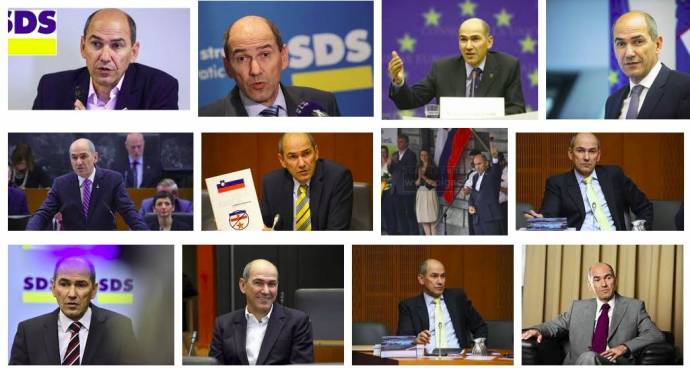Follow us on Facebook for more like this in your feed
The country's longest serving party president and the only of the independence-era figures still active in national politics, Janša has spent most of his career as the informal leader of the opposition.
Possessing an overpowering charisma, the 59-year-old is the epitome of the ideological divide in the country. One side sees him as the victim of a system that is still run by former Communist elites, while the other perceives him as a corrupt and dangerous demagogue.
His name has always been associated with political scandal, though none of the allegations against him have been conclusively proven or debunked in court, which has only served to fuel the conflicting interpretations.
Born in Ljubljana on 17 September 1958, Janša graduated in defence studies in 1982 and got a job at the defence secretariat, the Communist-era defence ministry.
In the 1980s he wrote a series of articles critical of the regime, many of them for the current news weekly Mladina.
In May 1988 he was arrested by the secret police after Mladina carried a transcript of a meeting in which the Yugoslav Communist leadership discussed arrests of problematic members of the progressive Association of Socialist Youth (ZSMS), of which Janša was a senior member.
Along with two of his colleagues and an army employee, he was charged with leaking a military secret and sentenced to prison by a military court.
The arrest and the trial sparked mass protests that acted as a catalyst for the democratic movement that eventually led to Slovenia's independence in 1991.
In the first multi-party elections in 1990, Janša was elected MP and became defence minister in the government built by DEMOS, a coalition formed by parties opposing the communist regime.
Under his guide, Slovenia set up a defence system which allowed the country to fight off aggression by the Yugoslav army and declare independence in June 1991.
Janša was ousted as defence minister in 1994, over the accusation of having authorised a special army unit to assault a civilian suspected of having leaked classified military information to the police.
He held the post of defence minister again under the centre-right government of Andrej Bajuk during its six-month spell in power in 2000.
Janša has served only one full stint as prime minister, yet his 2004-2008 coalition government is Slovenia's only so far to have served out full term without losing or adding new coalition partners.
As prime minister he presided over the Council of the EU when Slovenia held the bloc's rotating presidency in the first half of 2008 as the first newcomer to do so.
His party returned to opposition after the 2008 election, held in the aftermath of allegations that Janša had been bribed in the EUR 278m defence deal with the Finnish contractor Patria in 2006.
The trial in the case, which his supporters interpreted as a repeat of the 1988 show trial, began in September 2011, three months before the country's first ever snap election.
His party came second despite being favoured to win, but Janša went on to build a coalition government after Ljubljana Mayor Zoran Janković failed, despite his party emerging as the surprise winner.
Only a year into the term, marked by austerity and massive anti-government protests, Janša lost a vote of confidence over an anti-graft report which found that he could not account for his assets.
As Alenka Bratušek took over, Janša went on to be convicted in the Patria trial. He started serving his two-year jail sentence just before the 2014 snap election. Again, the SDS came second with 21% of the vote.
He spent 176 days in prison before the Constitutional Court ordered his release and eventually overturned convictions in 2015. However, the case became statute barred before coming to a retrial.
The timing of key events related to the trial prompted Janša and his party to bring damages suits against the state arguing that they had been robbed of election victory twice.
Over the years Janša and his party moved further to the right of the political spectrum, adopting a nativist agenda of the type advocated by Viktor Orban in Hungary and Donald Trump in the US.
Put off by his hard-line rhetoric and the culture struggle, many of his former supporters have abandoned him and few political parties are willing to cooperate with him.
Disliked by mainstream media, Janša holds those in contempt. Like Trump, he prefers to use Twitter to communicate with the public and his 50,000-plus followers, often making clever but acrid remarks.
Janša holds up Trump's victory as proof that democracy is working in the US. "Donald Trump won against corporations, against regime media who were 90% in favour of his rival," he has said.
Janša has written several books, including Premiki (1992, translated into English under the title "The Making of the Slovenian State") and Okopi (1994, "Barricades"), in which he offers his views on the problems of Slovenia's transition from Communism to a parliamentary democracy.
He has also written a historical novel called White Panther in which he explores the ethnic origins of the Slovenian nation in the Kingdom of Noric.
Janša is married to 20 years younger doctor Urška Bačovnik. Both alpine climbing fans, they have two small boys. He also has a grown-up son and daughter from a previous relationship.







